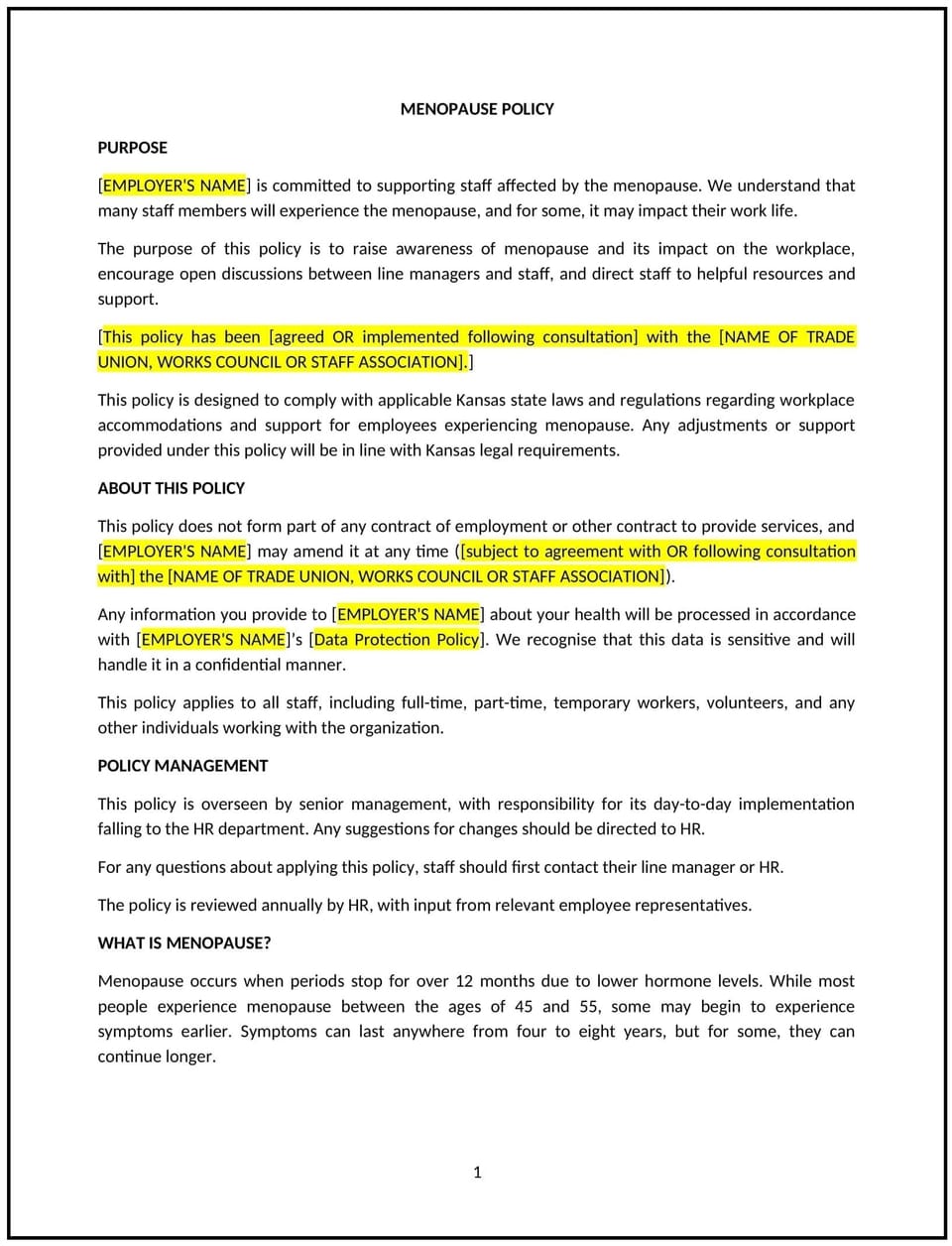Menopause policy (Kansas): Free template

Menopause policy (Kansas)
A menopause policy helps Kansas businesses provide support and understanding to employees experiencing menopause and related symptoms, ensuring a healthy and inclusive work environment. This policy outlines how the company will assist employees during menopause, including options for flexible work, adjustments to the workplace, and providing information about available resources.
By implementing this policy, businesses can foster a supportive environment, improve employee well-being, and retain valuable employees who might otherwise feel unsupported during this stage of life.
How to use this menopause policy (Kansas)
- Acknowledge menopause as a health condition: Businesses should recognize that menopause is a natural phase in life and that its symptoms can impact employees’ physical and emotional well-being.
- Offer flexible working options: Businesses should provide employees experiencing menopause with the option to request flexible working arrangements, such as adjusting working hours, remote work, or temporary changes to workload.
- Make reasonable workplace adjustments: Businesses should consider making adjustments to the physical workspace, such as ensuring proper ventilation, providing temperature control, or offering designated rest areas to alleviate discomfort.
- Provide access to support: Businesses should offer information on available health resources, such as Employee Assistance Programs (EAPs), counseling services, or healthcare providers who specialize in menopause care.
- Encourage open communication: Businesses should foster a culture of open communication, where employees feel comfortable discussing their needs or challenges related to menopause without fear of discrimination or judgment.
- Maintain privacy and confidentiality: Businesses should respect the privacy of employees and ensure that any medical information related to menopause is kept confidential and shared only with necessary personnel.
- Review and update regularly: Businesses should periodically review the policy to ensure it remains relevant and continues to meet the needs of employees.
Benefits of using a menopause policy (Kansas)
- Improves employee well-being: Providing support and flexibility helps employees manage menopause symptoms, improving their overall health and productivity.
- Enhances retention: Employees who feel supported during menopause are more likely to stay with the company, reducing turnover and retaining valuable talent.
- Creates an inclusive work environment: By acknowledging and supporting menopause, businesses promote inclusivity and diversity in the workplace.
- Reduces absenteeism: Offering flexible working arrangements or adjustments to the workplace can help employees manage symptoms and reduce the need for sick leave.
- Increases employee morale: Employees who feel that their company is understanding and supportive are more likely to feel valued and engaged in their work.
- Strengthens company reputation: A company that demonstrates a commitment to supporting employees through menopause is viewed as responsible, progressive, and caring, which can enhance its reputation.
Tips for using this menopause policy (Kansas)
- Communicate the policy clearly: Businesses should ensure that employees are aware of the menopause policy, the support available to them, and how to access resources.
- Train managers: Managers should be trained to recognize menopause-related symptoms and support employees with flexibility, adjustments, and confidentiality.
- Be proactive about adjustments: Businesses should regularly check in with employees who may be experiencing menopause to offer appropriate support and ensure their needs are being met.
- Respect privacy: Businesses should make sure that employees feel comfortable discussing menopause in a confidential and non-judgmental environment.
- Encourage a culture of openness: Promote open discussions about menopause, reducing stigma and fostering an inclusive work environment where employees can talk about their health challenges freely.
- Regularly review the policy: Businesses should evaluate and update the policy regularly to ensure it remains current with changes in employee needs and legal requirements.
Q: Why should Kansas businesses implement a menopause policy?
A: Businesses should implement a menopause policy to support employees experiencing menopause, improve employee well-being, reduce absenteeism, and create an inclusive work environment that values all employees.
Q: What kind of support should businesses offer employees experiencing menopause?
A: Businesses should offer flexible working arrangements, make reasonable workplace adjustments, provide access to health resources, and foster a culture of open communication regarding menopause-related challenges.
Q: Can employees request flexible working hours or adjustments during menopause?
A: Yes, businesses should allow employees to request flexible working hours, remote work, or adjustments to their workload as needed to manage menopause symptoms effectively.
Q: Is it necessary to keep menopause-related information confidential?
A: Yes, businesses should ensure that any medical information related to menopause is kept private and shared only with authorized personnel on a need-to-know basis.
Q: How often should businesses review and update their menopause policy?
A: Businesses should review the menopause policy at least annually or whenever there are significant changes in employee needs, workplace conditions, or legal regulations to ensure it remains effective and relevant.
Q: How can businesses create an inclusive environment for employees experiencing menopause?
A: Businesses can create an inclusive environment by acknowledging menopause as a health condition, offering support, reducing stigma, and encouraging open discussions about employees' needs and experiences.
This article contains general legal information and does not contain legal advice. Cobrief is not a law firm or a substitute for an attorney or law firm. The law is complex and changes often. For legal advice, please ask a lawyer.


